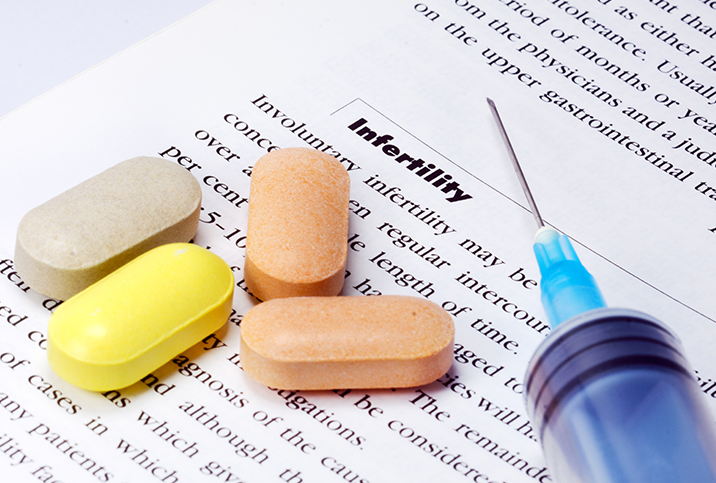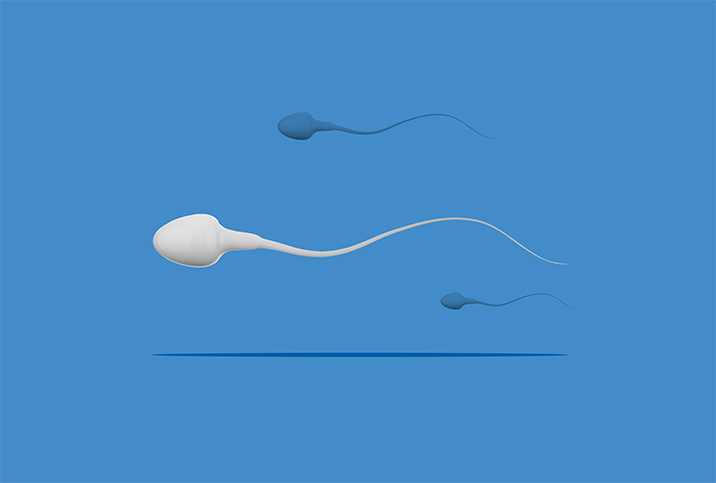What Couples Should Know About Men's Age and Fertility

Conventional wisdom would have us believe that men don't have an expiration date on their fertility as women do. There's a nugget of truth in there. Rolling Stones singer Mick Jagger fathered a child at age 73. In India, a man named Ramajit Raghav had a child in 2010 at the age of 94. And then he had another at 96.
Is such virility universal? No. While men can have sex later in life and ejaculate, the quality of their sperm doesn't always hold up. When certain sperm parameters are diminished, having kids when you're older can take longer and impact the baby. How? What effects do men's age and fertility have on conception and fetal development and health?
"Over the last four decades, the number of men older than 40 years old who father a child has more than doubled. However, researchers have only recently begun looking into the possible impact a father's age may have on his child," said Justin Houman, M.D., a reproductive urologist and men's health specialist at Tower Urology in Los Angeles and the medical director for Bastion Health, an app-based telehealth platform for men.
Studies indicate that older paternal ages raise the risk of congenital disabilities and mental disorders. How does a potential father's age affect pregnancy outcomes and children's health?
Why wait to have children?
There are legitimate reasons to wait until you are older to have kids. For instance, you can:
- Get your life on track
- Get settled in a stable career
- Reach financial security
- Build a home
Having this foundation in place can relieve stress before bringing a new life into your family. From a scientific point of view, studies show that older parents have more emotional stability and have been shown to live longer.
However, more research has come to light in recent years that suggests paternal age can have an impact on getting pregnant and the baby's health. So it's good to understand what happens to sperm as you age.
What happens to sperm as a man ages?
Men have a paternal biological clock, and their fertility decreases with age, just as it does in women, explained Jennifer Makarov, M.D., a board-certified OB-GYN and reproductive endocrinology and infertility specialist at New Hope Fertility in New York City.
"We start seeing as men get older, around their 30s but more so in their 40s or 50s, through sperm analysis, that their sperm motility starts to decrease and sperm concentration is lower," Makarov said.
She added that men older than 50 have more significant changes to their sperm quality, and these changes are correlated with decreased fertility as they age.
Houman discussed that as men age, testicular function decreases, resulting in:
- Decreased sperm production
- Diminished sperm motility (movement)
- Altered sperm morphology (shape)
When comparing the average level of sperm motility in men ages 30 to 35 with men over age 55, movement decreased by 54 percent.
"Studies have shown that sperm motility is best before age 25 and lowest after age 55," Houman said.
The other thing you can assess in sperm is called DNA fragmentation. To put it simply, a sperm's genetic material is more likely to be damaged as a man ages.
"We see sperm DNA fragmentation start to increase, meaning the sperm has more DNA damage once men hit age 50," Makarov said.
Waiting to have a baby until the father is in his 40s or 50s can be more challenging because of these reproductive changes. In a study published in the journal Fertility and Sterility, couples whose father was older than 30 took nearly twice as long to get pregnant than couples whose male partner was 20 to 24 years old. The same study found the average time to pregnancy was more than three times as long for fathers older than 44.
What are the effects of age and sperm changes on the child?
As well as impacting fertility, sperm changes and paternal age could affect the baby.
"Increasing paternal age has been shown to increase the incidence of autism, schizophrenia, bipolar disorders, leukemia, miscarriage and stillbirths," Houman said.
The increased risk varies quite a lot from study to study. For example, a 2017 study published in Nature identified that you are 5 percent to 10 percent more likely to have a child with autism in your 40s than you are in your 20s.
But a larger study of more than 132,000 families found the risk of autism is nearly 600 percent higher when the father is 40 or older, compared with children of fathers younger than 30.
Makarov added there is an association between fathers, specifically, men in their 50s or older, and an increased incidence of autism and schizophrenia in their children. Even childhood cancer, such as childhood leukemia, occurs more often, though "more often" doesn't mean all the time.
"I do want to point out that this is not a huge number, and newborn children can be affected by anomalies. We see anomalies in about 1 percent of all newborns. This may increase up to 2 percent of newborns born to fathers over age 50," Makarov said. "So it is a real increase, but still, most children born to older men are healthy."
What to know if you want to wait to have a family
Makarov advised that there's a slight increase in congenital abnormalities in babies born to older fathers. She added that paternal age can affect the pregnancy outcome in the fertility clinic.
A recent study published in the journal Human Reproduction found paternal age can impact assisted reproductive technology (ART) success and live birth rates more than originally thought. This research highlights that clinicians should discuss paternal age with couples undergoing fertility treatments and how it may impact their chances of success.
"We see that when using sperm from older men, eggs don't fertilize or grow as well, and we can produce poorer-quality embryos from older men," Makarov explained. "There has also been a link to older fathers and increased miscarriage rates, so the paternal biological clock is a real thing."
She said it might be wise for men to freeze sperm when they are younger, because that sperm should retain its quality and have less DNA fragmentation damage.
"It is something not widely discussed, but it makes sense medically to consider freezing your sperm if you definitely want to delay having a family until you're in your 40s or 50s," Makarov said.


















